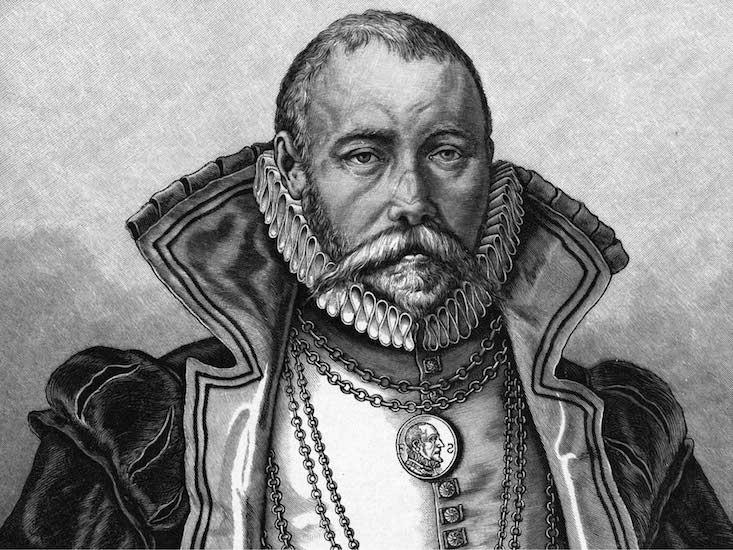Good astronomy means you need good data, and before the invention of the telescope in the 17th century, good data was hard to come by.
先进的天文学需要完备的数据。但在17世纪发明望远镜以前,完备的数据是很难获得的。
16th-century astronomer Tycho Brahe tried to make his observations as accurate as possible anyway, and ended up revolutionizing how we think about astronomy.
16世纪的天文学家第谷·布拉赫只是试图让观测更加精确,但最后他颠覆了人类对天文学的看法。
He was also a little... unusual. Brahe was born to rich Danish nobles in 1546, and was kidnapped by his paternal uncle when he was around two.
他本人是特立独行的,1546年,布拉赫出生于富裕的丹麦贵族。在大约2岁的时候,被自己的叔父拐走了。
His parents just let the man keep him. When he was a teenager, he went to study law at the University of Copenhagen,
但他的父母就听之任之,他少年的时候就在哥本哈根大学专攻法律了,
but after seeing a solar eclipse in 1560, he decided to become an astronomer instead.
但1560年他见过日食之后,就决定转行做天文学家。
Then, in 1566, at the age of 20, he lost part of his nose in a duel with a classmate over who was the better mathematician,
1566年,布拉赫20岁,他鼻子破了半边,因为一个同学跟他就谁是更好的数学家而起了争执,
which is why he wore a metal prosthetic nose for the rest of his life.
这也是他余生一直带着金属材质假体鼻子的原因。
Six years later, a new object appeared in the sky, in the constellation of Cassiopeia.
6年后,天际中出现了一个新的物体,出现的位置是仙后座星群。
At the time, people thought space was unchangeable, so if anything new showed up in the sky, they assumed it was happening in Earth's atmosphere.
当时,大家都认为宇宙是一成不变的,所以如果天空里出现新的事物,大家就会认为是地球的大气层有了变化。
But Brahe noticed this new object, which we now know was a supernova, never appeared to change position relative to the stars around it.
但布拉赫注意到了这个物体,其实就是我们现在所称的超新星,它跟其周围的恒星位置是相对静止的。
He understood parallax, the closer an object is to an observer,
他对视差了解一二,物体离观测者越近,
the more it appears to change position when either it or the observer moves It's like how when you're driving down the road,
那么物体和观测者的移动所造成的物体移动的感官就越明显,就像你驱车行驶的时候,
the tree in the foreground flies past you while the mountain range in the background stays put.
前景中的数都被你泡在身后,而远处的群山却看似岿然不动一样。
When Brahe saw that the supernova didn't move separately from the other stars, he realized it couldn't be as close as the atmosphere..
布拉赫发现,这颗超新星不会像其他恒星一样移动,他就意识到它位于地球的大气层之外。
A few years later, while observing a comet, Brahe saw that it did have parallax, but less than the moon, so it had to be farther away.
几年后,在观测一颗彗星时,布拉赫发现它是有视差的,但比月球的视差小,所以肯定更远。
That was another obvious change in the supposedly unchangeable outer space.
这是一项明显的改变,证明外太空并非我们所想的一成不变。
By now, Brahe had been hired by King Frederick II of Denmark, who gave him an entire island to do his science.
而现在,布拉赫受雇于弗雷德里克二世,后者赠予他整个岛屿,让他研究科学。
There Brahe built an observatory called Uraniborg and filled it with fancy equipment.
在岛上,布拉赫见了一个天文台,名为乌拉尼堡天文台,还部署了精良的设备。
He improved upon simple instruments like quadrants and sextants for measuring angles and armillary spheres for modeling the sky,
他改进了简单的设备,比如象限和六分仪,从而为天空建模进行角度和浑天仪的丈量,
by building giant, elaborate versions of them and recalibrating them a lot.
他改进的方式是建造出这些设备的大型精良版本,并进行大幅的重新校准。
It also helped that he collected data constantly, studying the sky not just every once in awhile, but almost every single night.
对他研究另有帮助的是:他不断地手机数据;研究天空也并非三分钟热度,他几乎每个晚上都会研究。
He ended up cataloguing more than 1000 new stars, and his meticulous observations showed that they didn't seem to move at all relative to one another.
最后,他编目了100多颗恒星的信息。经过精心的观测他发现,他们之间的运动并非相对静止的。
This meant either the stars were so far away that the parallax was too slight to see, or there was no parallax at all because Earth didn't move.
这表明:要么是这些恒星太过遥远,视差不足以观测到相对运动的结果;要么就根本没有视差的说法,因为地球是静止的。

He thought it would make a lot more sense if Earth was sitting still, so he formed his own model of the solar system,
他觉得,如果地球是静止不动的,那就非常说得通了,于是他做了太阳系的建模。
a sort of intermediate step between Ptolemy's Earth-centric model and Copernicus' sun-centric model.
他的版本介于托勒密的地球中心版本和哥白尼的太阳中心版本之间。
According to Brahe's idea, Earth stayed put at the center of the universe, orbited by the moon and sun and stars,
布拉赫认为,地球在宇宙的中心,其周围有月球、太阳和其他恒星的环绕,
while the other planets in the solar system orbited the sun.
而太阳系里的其他行星围着太阳转。
We now know that that wasn't true, obviously but it was a step in the right direction.
现在的我们都知道这不是事实,很明显但这是迈向正确方向的一步。
When he wasn't busy watching the sky, Brahe was busy being a sixteenth-century Gatsby.
他不观测星空的时候,就是一个16世纪的盖茨比。
He was incredibly wealthy, and liked to spend his money on parties and novelties, like the pet that people called an elk but may have actually been a moose.
他极为富有,喜欢把钱花在聚会和不同寻常的事情上,比如他会饲养人们称之为麋鹿的宠物,但实际上可能只是一只驼鹿。
Unfortunately, the elk-moose died after getting drunk at Brahe's friend's house and falling down some stairs.
不幸的是,这只宠物在他的朋友家喝醉了酒,摔下了几节楼梯。
Then, rumors started going around that Brahe had an affair with Denmark's queen, and her son Christian IV didn't appreciate it.
随后,流言四起,大家都说布拉赫与丹麦皇后有情事,皇后的儿子克里斯蒂安四世听了很不高兴。
So when the young king took power in 1588, Brahe ran away to Prague, where he became the official imperial mathematician to Holy Roman Emperor Rudolph II.
所以,克里斯蒂安四世1588年继位以后,布拉赫就逃往布拉格。在那里,他成为了一名皇室数学家,为神圣罗马皇帝奥托二世服务。
There, he hired an assistant, a young German astronomer named Johannes Kepler, who you might know as the guy who went on to change how we think about orbits.
在皇宫期间,他雇佣了一名助手。助手是一名年轻的德国天文学家,名叫约翰尼斯·开普勒。大家可能对开普勒有所耳闻,他改变了我们对轨道的看法。
In 1601, at the age of 54, Brahe went to his last party. He drank way too much,
1601年,布拉赫54岁。那一年,他参加了人生中的最后一次派对,派对上,他酩酊大醉,
and supposedly refused to leave the banquet to relieve himself, because it would've been considered rude.
又拒绝离开宴席解手,因为他觉得这样不礼貌。
Then, after 11 days of bladder pain, he died. It seems he ruptured his bladder from holding in his pee.
于是,他膀胱疼了11天之后就离世了,貌似是他忍着不去解手,导致膀胱发生了破裂。
Even though Kepler was his assistant, Brahe kept most of his observations secret.
虽然开普勒是他的助手,但布拉赫的大多数观测都是不为他人所知的。
So for a while, some people thought Kepler poisoned Brahe to get access to his data, and the pee thing was just a cover story.
所以,有一段时间,一些人认为,是开普勒给布拉赫下毒,以获取他观测的数据。而憋尿而死只是一个幌子而已。
But when Brahe's body was exhumed in 2010, researchers found no evidence of poisoning, so Kepler's off the hook.
但2010年,布拉赫的尸体出土。研究人员没有发现下毒的证据,所以排除了开普勒下的嫌疑。
Brahe's observation catalogs were meant to be passed to his children,
布拉赫的观察数据本应该传给自己的孩子,
but Kepler took advantage of some confusion about the inheritance and took the data before his kids had a chance to.
但开普勒利用人们对医嘱理解的出入,在布拉赫的孩子拿到数据之前就率先下手了。
When Kepler looked over Brahe's detailed observations on the motion of the planets, he realized that planets orbit the sun not in circles, but in ellipses.
开普勒浏览了布拉赫对于行星运动的详细观测数据,然后开普勒意识到,行星并非以圆形围绕太阳运动,而是以椭圆形。
Being a part of this breakthrough was probably Brahe's most important astronomical contribution of all.
布拉赫也为这次突破做出了贡献,这可能是布拉赫最重要的天文学贡献了。
It's just too bad he wasn't alive for it. Thanks for watching this episode of SciShow Space, which was brought to you by our patrons on Patreon.
遗憾的是,他生前没有见证这一切,感谢收看本期的《太空科学秀》,我知道,很多小伙伴都是通过口口相传的力量得知我们栏目的。
If that's you: Thank you! We couldn't have done it without you.
如果你也是口口相传的一员,那么我们非常感谢,没有你们的支持,就没有栏目的成功。
And if you want to be part of the team, just go to patreon.com/scishow.
如果大家想加入我们,就去patreon.com/scishow看看吧。
And don't forget to go to youtube.com/scishowspace and subscribe!
记得订阅youtube.com/scishowspace哦!











